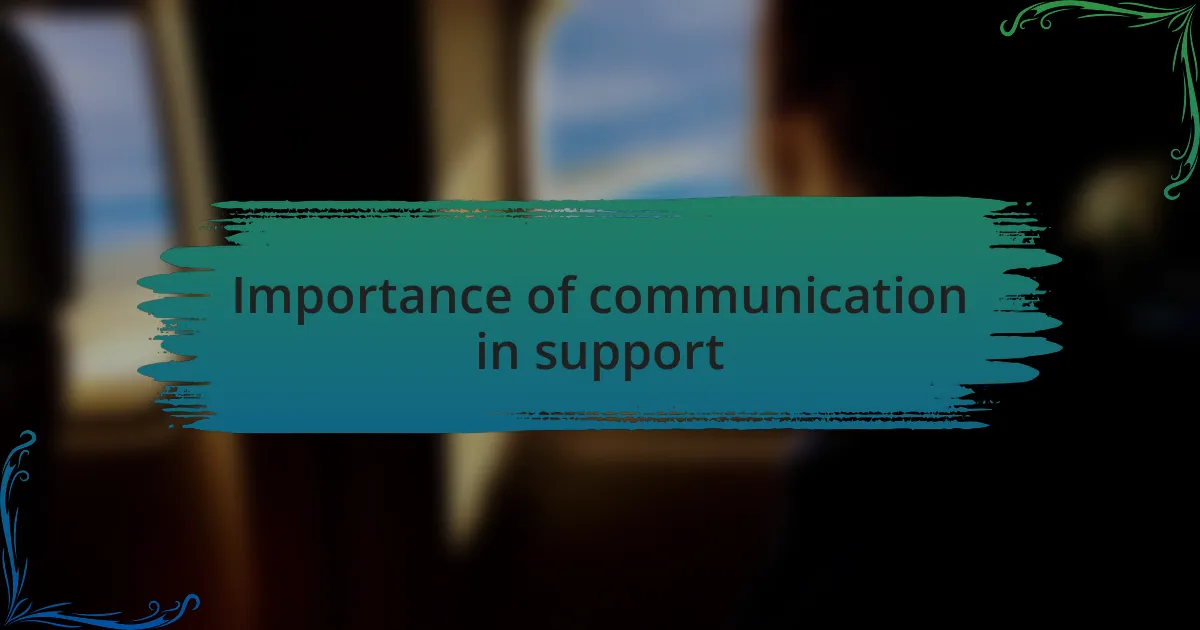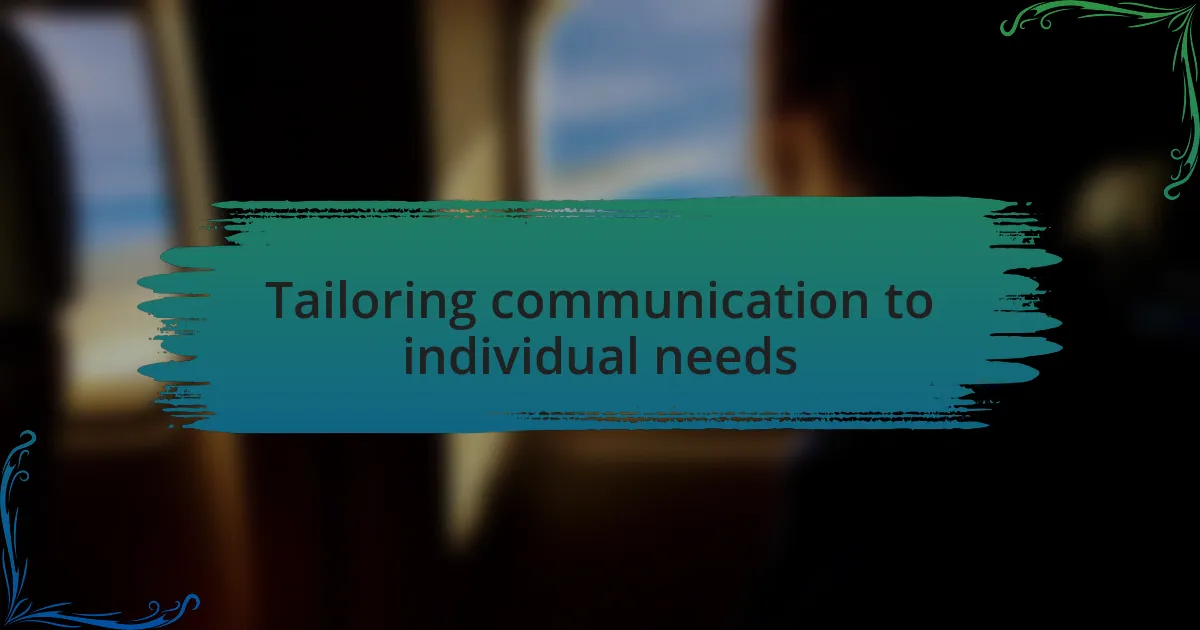Key takeaways:
- Effective communication involves empathy, active listening, and clarity, transforming interactions into meaningful experiences.
- Clear and concise messages, along with tailored communication, enhance customer understanding and satisfaction.
- Building rapport and personal connections with customers fosters trust and improves the overall support experience.
- Utilizing straightforward language and considering individual preferences can significantly enhance customer interactions.

Understanding effective communication
Effective communication is about more than just exchanging information; it’s about connecting with others on a deeper level. I recall a time when I faced a misunderstanding regarding a flight booking. The agent’s calm demeanor and clarity in explaining the situation helped me feel heard and valued, transforming a frustrating moment into a positive one. Have you ever had an interaction that changed your perspective simply because of how someone communicated with you?
Whenever I think about communication, I realize how much tone and body language can enhance or detract from our messages. During a recent conversation with a friend, we both missed the nuances of our non-verbal cues over a video call, leading to an awkward pause. Moments like that remind me of the importance of actively listening and being aware of how our interactions shape our relationships.
Ultimately, effective support communication is rooted in empathy and understanding. It’s about being open and genuine in our interactions, making sure the other person feels comfortable expressing their needs. I’ve found that asking open-ended questions, like “How can I best assist you today?” can lead to more fruitful exchanges. What strategies do you think could make your conversations more effective?

Importance of communication in support
Clear communication plays a pivotal role in support interactions. I remember reaching out to customer service when my baggage went missing. The representative’s thorough update on the process calmed my nerves, as their clarity made my concerns feel valid. What happens when support staff miss the mark in their explanations? The experience can quickly escalate from inconvenience to frustration.
In my experience, the emotional tone of communication can significantly impact a customer’s perception. Once, I spoke with a support agent who genuinely expressed understanding about my travel troubles. This empathic response made all the difference, creating a sense of partnership rather than just a transaction. How do you think empathy in support influences the overall customer experience?
Moreover, effective communication fosters trust, which is essential in any support scenario. I often find that when a support agent takes the time to explain the options available, I feel more empowered in my choices. Have you ever noticed that when you understand your options clearly, you’re more likely to engage positively? This openness leads to repeat interactions and loyalty, a vital component for any service-oriented organization.

Crafting clear and concise messages
Effective support communication hinges on the ability to convey messages that are both clear and concise. I recall a time when I received a straightforward email from a customer service representative at Thai Airways regarding a flight delay. The brief yet informative nature of the message, which included the reason for the delay and alternative options, allowed me to plan my next steps without feeling overwhelmed by unnecessary details. Have you ever felt relieved when information is presented simply and directly?
When crafting messages, it’s crucial to consider the audience’s perspective. For instance, during a particularly hectic travel season, I once encountered a situation where information about flight changes was buried under lengthy paragraphs. Frustratingly, I struggled to find the key points. This experience highlighted how vital it is to use bullet points or numbered lists to break down complex information, ensuring that important details are easily accessible. Wouldn’t you agree that a well-structured message can transform a stressful situation into a manageable one?
Additionally, utilizing straightforward language can prevent misunderstandings that often lead to further complications. I remember an instance where a support agent patiently clarified a policy I initially found confusing, using simple terms rather than jargons. That shift in language not only made the policy comprehensible but also built my confidence in the airline’s support team. Who wouldn’t prefer an explanation that feels personal and relatable rather than a technical barrage?

Building rapport with customers
Building rapport with customers is all about creating a connection that feels genuine and supportive. I recall a moment when I called Thai Airways for assistance, and the agent started the conversation with a warm greeting and asked about my day. That small gesture instantly made me feel valued and more relaxed, allowing for a smoother interaction. Isn’t it amazing how a simple hello can set the tone for the entire exchange?
When agents take the time to empathize with customers, it fosters an environment of trust. I experienced this firsthand when I expressed my concerns about travel during uncertain times. The representative not only listened intently but also shared a personal story about a similar experience, reassuring me that they genuinely understood my situation. That level of empathy made me feel like more than just another ticket number. Have you ever felt that instant connection that calms your worries?
Moreover, building rapport involves asking open-ended questions to engage the customer further. On a recent call, the agent inquired about my travel needs rather than just jumping into solutions. This approach made me feel like a partner in the conversation, rather than just a problem to be solved. Reflecting on this, I think the best support comes from those who see customers as individuals with unique journeys. Wouldn’t you agree that establishing such connections is key to outstanding service?

Tailoring communication to individual needs
Tailoring communication to meet individual needs is a crucial aspect of effective customer support. I recall a time when an agent noticed I had specific dietary preferences while booking my meal on a flight. Instead of offering a generic menu, they took the time to ask me questions about my preferences, which made me feel understood and respected. Doesn’t it feel great when someone goes the extra mile to acknowledge your unique requirements?
It’s essential to adapt communication styles based on the customer’s personality. I once spoke with an agent who quickly recognized that I preferred a straightforward approach. By skipping the jargon and getting straight to the solutions, they made the interaction not only efficient but also enjoyable. Have you ever been in a situation where you wished the other party could just cut to the chase? It emphasized how a little flexibility in communication style can dramatically enhance customer satisfaction.
Moreover, the level of responsiveness tailored to each customer can make a significant difference. There was a moment when I contacted Thai Airways regarding a flight change, and the agent not only addressed my inquiry promptly but also suggested alternatives based on previous bookings I’d had with them. It felt as if they had prepared just for me, showing that they valued my history with the airline. Isn’t it reassuring when businesses take the time to reflect on your past interactions, making you feel like an important part of their journey?
